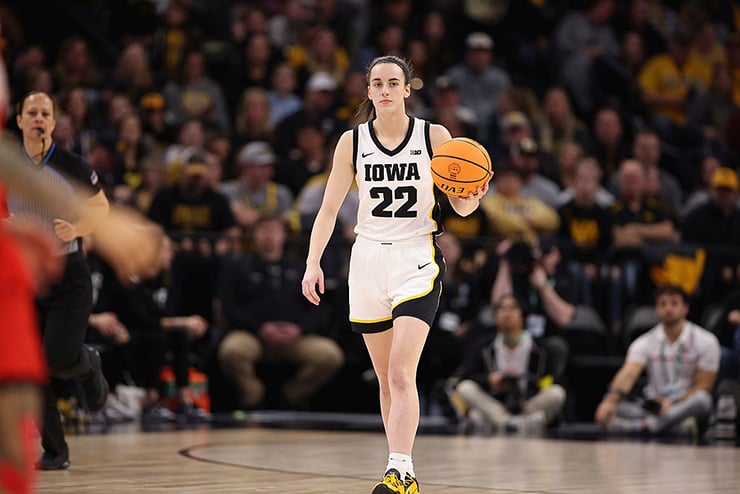Caitlin Clark, the 22-year-old basketball phenom, has been making waves in the professional sports world. After being selected by the Indiana Fever as the No. 1 overall pick in the WNBA draft following an illustrious college career at top-ranked Iowa, Clark has been the victim of nonstop attacks—many of which have come from her fellow athletes.
Like sports legends Tiger Woods, Michael Jordan, and others, Clark has almost singlehandedly revived interest in her once failing sport. When Clark joined the WNBA, 2.1 million viewers tuned in to watch her debut game with the Fever, shattering the all-time viewership record for any WNBA game. In the first five games of 2024, average viewership reached an astounding 1.4 million compared to a meager 440,000 the previous year, itself a high watermark for the league.
Clark has received plaudits from the likes of Michael Jordan, Charles Barkley, and Lebron James, all of whom have underscored her impact on women’s basketball. “Y’all should be thanking that girl for getting y’all … private charters,” quipped Barkley, the legendary NBA power forward, during a post-game interview for ESPN Sports. During his podcast, “Mind The Game,” James added his voice to the chorus stating, “Caitlin Clark is the reason why a lot of great things are gonna happen for the WNBA.” But such praise comes amid a torrent of criticism that spans Clark’s appearance to her supposed “privilege.”
In May, during a taping of The View, Sunny Hostin mused that Clark is “more relatable to people because she’s white, because she’s attractive.” In an interview for Uproxx, fellow rookie Cameron Brink argued there is a “younger white privilege” that she—and Caitlin Clark—have benefited from: “… there is a privilege that we have inherently, and the privilege of appearing feminine. Some of my teammates are more masculine. Some of my teammates go by they/them pronouns.”
But it doesn’t stop there. Since joining the Fever, Clark has been the subject of excessive physical targeting—with Chicago Sky guard Chennedy Carter going out of her way to bodycheck Clark during a June 1 game, which was retroactively upgraded to a flagrant foul. Carter’s actions, for which she refused to apologize, were visibly cheered by fellow teammate Angel Reese, a contender for Rookie of the Year. The lackadaisical response from the league even prompted Representative Jim Banks (R-Ind.) to write a searing letter to WNBA commissioner Cathy Englebert.
The problem, of course, isn’t that Clark has underperformed or that she is a nasty person with an enormous ego. Just the opposite, in fact—recently, Clark became the first rookie in WNBA history to record a triple-double! The problem is that Clark is a straight, white Christian in a league dominated by black, progressive lesbians. But race is just a cover for the visceral criticism. What really galls her critics is precisely what makes Clark so appealing: She is normal.
Clark’s stardom, we are told, is a consequence of her prettiness and whiteness. Even her shoe brand deal with Nike—a sponsorship that reportedly rivals Michael Jordan’s—is put forward as evidence of the marketability of “heteronormativity” in a league that is over 30 percent LGBTQ+. And it’s hard to disagree. Clark, no doubt, is unbelievably talented. But talent counts for little when race-baiting progressive ideologues exercise control over every major sociocultural institution. Clark’s great sin—the only unforgivable one—is that she refuses to engage in the self-flagellating penance that is demanded of her.
To be reproached for being apolitical in a sports league only underscores the strangeness of the times in which we live, yet it serves to highlight a truth the wokies understand better than most conservatives: To be apolitical is to pick a side just as “not to choose” is to “choose not to.” Clark’s choice not to be political marks her out as a conservative, just as her femininity and sexuality attest to her rejection of the ugly and freakish. Clark is, in the words of Twitter personality Edmund Smirk, a shining example of “Swiftian Normality.” Heck, here’s a video of Clark autographing an ultrasound.
The hatred of Caitlin Clark is familiar and resonates because it is a feeling most Americans experience each day. When coastal elites contemptuously refer to the “deplorables” in flyover country, those idiot prudes in middle America, they mean people like Caitlin Clark—people like you and I. Ours is a regime that cannot abide faithful, monogamous, workaday Americans who live by the tenets of the Christian faith instead of the shibboleths of secular liberalism. Excellence coupled with normality is intolerable and must be destroyed—even when it’s a 22-year-old Catholic girl from West Des Moines.

Leave a Reply